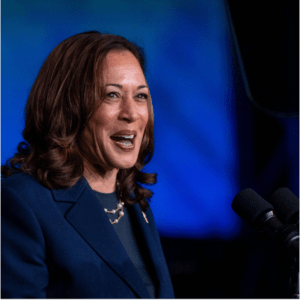There are signs that things could turn in her favour.

July 31, 2024, Houston, Texas. Vice President Kamala Harris speaks at Sixtieth Biennial Boule, her third visit to Texas in a month.
August 3, 2024
Certainly not ‘fell out of a coconut tree.’ Who is Kamala Harris – and could she defeat Trump?
“I took on perpetrators of all kinds. Predators who abused women. Fraudsters who ripped off consumers. Cheaters who broke the rules for their own gain. So hear me when I say I know Donald Trump’s type. In this campaign, I promise you, I will proudly put my record against his any day of the week,” Kamala Harris said at her first rally in Milwaukee, Wisconsin.
Having secured a majority of delegate votes before the National Democratic Convention later in August, the vice president (VP) of the United States is now officially the Democratic Party nominee before the presidential elections scheduled for November 5 this year. She has also managed to revive the Democratic campaign: donations and volunteers have been pouring in at record levels since she started her bid for the presidency.
Harris was endorsed by President Joe Biden, who will not seek re-election – he quit the presidential race after weeks of controversies following his poor performance during the debate with the Republican candidate, Donald Trump, in June.
Although Harris has spent the last three and a half years in the White House, she was rarely in the spotlight. Now, she has a chance to become the first-ever woman to take the most significant job in politics.
So – who really is Kamala Devi Harris, and will she deliver on the job of defeating Donald Trump?
Born on October 20, 1964, in Oakland, California, Kamala Harris grew up in an immigrant household – her mother, Shyamala Gopalan, arrived from India in 1958, and her father, Donald J. Harris, migrated from Jamaica in the 1960s.
They both went to America to seek educational opportunities – their paths crossed for the first time at the University of California, Berkeley, during a meeting of the Afro-American Association, where he delivered a speech and she was one of the attendees.
Both went on to be successful, her mother as a breast cancer scientist, her father as an economist. After Shyamala’s death in 2009, the Breast Cancer Action Foundation published an obituary, saying that her ‘work in isolating and characterizing the progesterone receptor gene transformed the medical establishment’s understanding of the hormone-responsiveness of breast tissue.’
“My mother would look at me and she’d say, ‘Kamala, you may be the first to do many things, but make sure you are not the last,’” Harris recalled her late mother’s words.
Her father, aged 85, is an emeritus professor of economics at Stanford University. He devoted his life to post-Keynesian economics, contributing to the understanding of inequalities in wealth distribution in capitalist economies.
Her parents were also politically active and involved in the civil rights movement. The seed of social justice planted by her parents blossomed when she decided to become a public servant – after university (she graduated from Howard University in Washington, DC and then the University of California’s Hastings College of Law), she took a job as a deputy district attorney in Alameda County, California.
She worked there for a decade, until 2000, when she strongly objected to Proposition 21, which allowed prosecutors to try juvenile offenders as adults, and subsequently quit the office.
For the next four years, until 2004, she worked for San Francisco’s city attorney, Louise Renne, representing the city in child abuse and neglect cases.
In 2004, with Renne’s endorsement, she was elected for the first time – to the position of district attorney in San Francisco. Since that moment, she has been unstoppable.
She served two terms as the head of the agency responsible for the prosecution of crimes in the city and county of San Francisco, and in 2010, she secured an even bigger job: she was elected attorney general for California.
A path to Washington, DC opened for Harris in 2015, when Barbara Boxer, a Democrat who represented California for over 20 years in the US Senate, announced she would not seek re-election in 2016.
Harris did not hesitate – a week after Boxer’s announcement, she sent an email to supporters, stating: “I’m launching my campaign to represent the People of California in the United States Senate.”
Endorsed by then-president Barack Obama, Harris won her seat in the Senate in November 2016, a fact that went almost unnoticed given that on the same day, Donald Trump defeated Hillary Clinton in the run for the White House. Harris immediately vowed to defend migrants who were targeted by the new administration.
After only one term in the Senate, she attempted to move towards even greater power – in 2019, she started her unsuccessful presidential campaign.
But her presence in the race resulted in yet another promotion. Having won the nomination, Joe Biden (whom Harris endorsed) chose her to join him on the Democratic ticket in 2020 as the nominee for vice president.
With her vast experience as a lawyer and politician, Harris had perfect qualifications for the job. As a Black South Asian American woman, she added not only expertise to the ticket but also guaranteed connection with voters from groups that were difficult to approach for an older, white gentleman such as Biden.
With her hand on two Bibles, on January 20, 2021, Kamala Harris was sworn into office as the first-ever female VP in the history of the United States.
“I, Kamala Devi Harris, do solemnly swear that I will support and defend the Constitution of the United States against all enemies, foreign and domestic; that I will bear true faith and allegiance to the same; that I take this obligation freely, without any mental reservation or purpose of evasion; and that I will well and faithfully discharge the duties of the office on which I am about to enter. So help me God,” she said to Justice Sonia Sotomayor, herself the first non-white woman to serve on the US Supreme Court.
Although well-rated, Harris’s time in the White House was not eventful – she was often said to be in Joe Biden’s shadow. She was, however, pivotal in the first years of their administration – as VP, she broke ties in Senate votes that were split equally between Democrats and Republicans.
My fellow Democrats, I have decided not to accept the nomination and to focus all my energies on my duties as President for the remainder of my term. My very first decision as the party nominee in 2020 was to pick Kamala Harris as my Vice President. And it’s been the best… pic.twitter.com/x8DnvuImJV
— Joe Biden (@JoeBiden) July 21, 2024
The first weeks of Harris’s campaign have shown her ability to move to the front line of politics.
Polls released after the announcement of her candidacy showed that her standing is stronger than Biden’s, but still indicate that Trump is leading in the race – and Harris herself warns that the Democrats are the “underdog”. There are, however, some signs that the race could turn in her favour.
Especially where young voters are considered, Harris has proved that she has the advantage of being very marketable – unlike Biden, whose campaign struggled to connect with people in the modern media environment.
Harris’s online presence is appealing to younger voters, and clips from her public appearances and interviews continue to go viral on social media. One prominent example is her laughing and saying: “You think you just fell out of a coconut tree? You exist in the context of all in which you live and what came before you.”
Unlike the online edits of Donald Trump and Joe Biden,, Harris’s susceptibility to being turned into a meme has largely been positive for the VP.
Harris also holds the advantage of being able to quickly attract endorsements from outside political circles – and in some demographics, endorsement from the Obamas is worth less than a supportive tweet from popstar Charli XCX. Such support is also cleverly capitalised by Kamala’s team, who changed her official ‘Kamala HQ’ account on X to the iconic black lettering on a neon-green background used by Charli XCX on her BRAT album.
Another example of how stars are aligning for Harris is that none other than Beyoncé, Queen B herself, permitted the use of her song ‘Freedom’ in a political clip.
Kamala’s team further proved their social media skills when they participated in a TikTok trend promoting her for president as a “phenomenon” in contrast to unflattering photos of Donald Trump which many TikTok users have done before.
“The way Harris has been embraced in pop culture could be significant in her presidential campaign and is changing the way she’s viewed among a large swath of voters, especially young people,” wrote Glamour.
For now, Kamala Harris has definitely resurrected the Democrats’ campaign and taken advantage of widespread support, both in political and cultural circles. There are, however, a number of questions that need to be answered before a woman can take the highest seat in the land.
Will she be able to unify the Democratic Party? Can she take the lead in the race? Will she be able to follow in Obama’s footsteps and connect with traditional Democrat voters, such as farmers and working-class white people from the crucial Midwest states of Wisconsin, Michigan and Pennsylvania? Who will be with her on the ticket? And will those young people, who consider her a ‘cultural icon’, turn into actual voters?
For these answers, we’ll likely have to wait until all the votes are counted.




